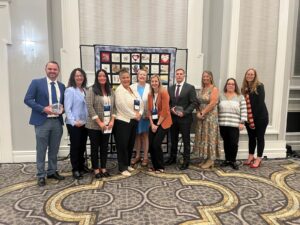Northwest Treatment Foster Collaborative honored again
By Sheri Trusty, Seneca County Media Relations Coordinator
Children in foster care face obstacles and loss, but in Northwest Ohio, they also have an extraordinary group of professionals who are doing everything they can to minimize the trauma experienced by children who are removed from their homes. The Mental Health and Recovery Services Board of Seneca, Ottawa, Sandusky and Wyandot Counties (MHRSB), along with the Department of Job and Family Services (JFS) in Sandusky, Ottawa, Seneca and Wyandot counties, joined to form the Northwest Treatment Foster Collaborative with an overriding goal of keeping foster children in their home communities.

The collaborative focuses on licensing therapeutic foster homes for children with complex needs, including behavioral, mental health or physical challenges. The four counties share costs and resources, creating opportunities for foster children to remain in their school districts.
On Sept. 11, the Child and Family Advocate of the Year award was presented to The Northwest Treatment Foster Collaborative at the Public Children Services Association of Ohio (PCSAO) 2024 Annual Conference. The award honors the visionary impact the group is making on foster children in the four-county area.
This year’s award was especially significant. The collaborative’s work is so unique that PCSAO made the unusual decision to present the award to a member of the association.
“What’s different this year is that we normally award this to an external organization,” said PCSAO Assistant Director Scott Britton. “But they worked to create this program and change the narrative for kids and help them to heal. We felt that was deserving of recognition. This group did such an extraordinary thing.”
This isn’t the first time the Northwest Treatment Foster Collaborative has been recognized. Governor Mike DeWine praised the group’s work during his April 10 State of the State address. The revolutionary program has been set as a model across the state.

“Governor DeWine put money into replicating this across the state,” said Seneca County JFS Director Kathy Oliver. “The reason we believe in this model is, we can keep children close to home. We don’t have to send them across the state or out of the state. It’s been wonderful.”
Britton said the mission of the Northwest Treatment Foster Collaborative aligns with the Children’s Continuum of Care Reform Plan created by the PCSAO in 2018.
“The crux of that plan is that kids need to grow up in a family, not an institution,” Britton said. “This program creates therapeutic homes that will hopefully reunify families more quickly.”
Ottawa County JFS Director Stephanie Kowal understands that removing a child far from home adds trauma to an already difficult life transition.
“Children belong in homes, and unless absolutely necessary, not in institutions,” Kowal said. “It really is an honor to be part of a team that recognizes the needs of our children in foster care and works so hard to improve their experience in care.”
Oliver said children experience more loss when they move into foster care outside their community.
“It’s hard on kids because they lose their neighborhood. They’re away from their family and away from their school. They may have connections to a local church or YMCA that they lose. We want to keep those connections, if we can,” Oliver said. “I’m grateful to be a part of this project because it helps us provide better care for the children and keep them in the county.”
MHRSB Executive Director Mircea Handru was instrumental in organizing the Northwest Treatment Foster Collaborative.
“I’m excited about the continued partnership between the four counties and for us to continue to implement services for children with higher needs,” Handru said.
To fully reach that goal, more families need to open their homes to foster children with challenges.
“We just need more families to step up and open their homes to kids who are older and may have challenging behavioral issues,” Britton said.
